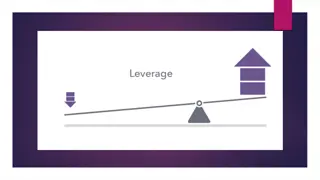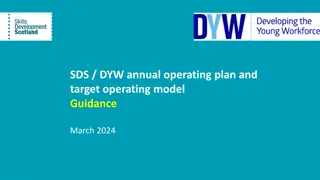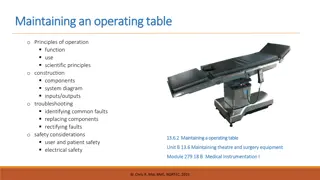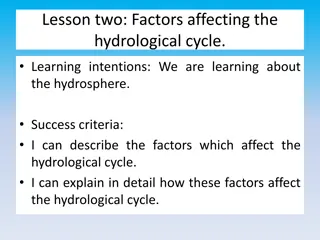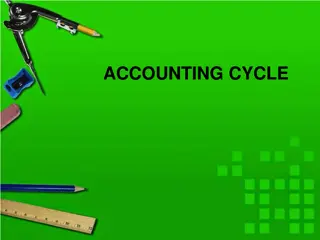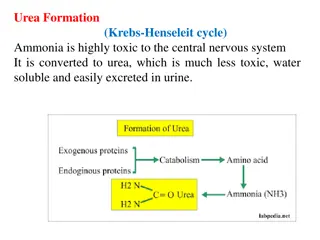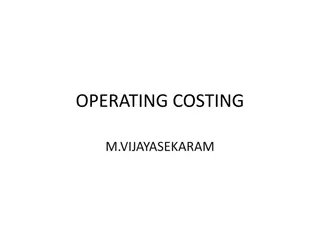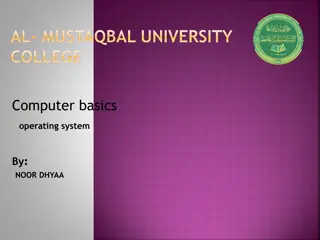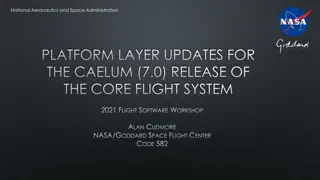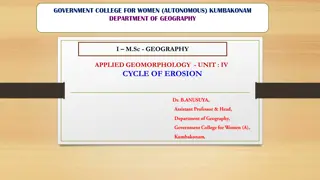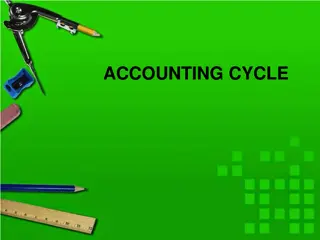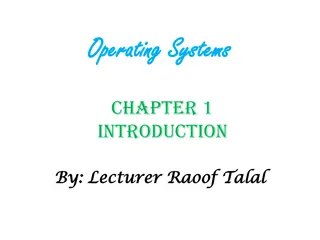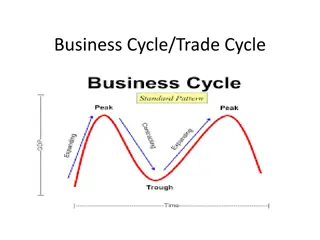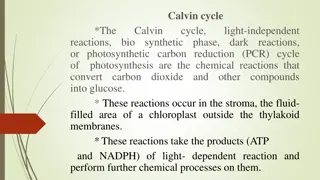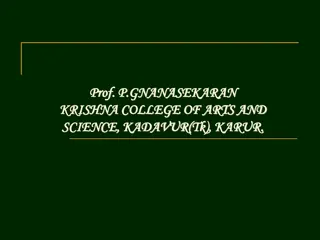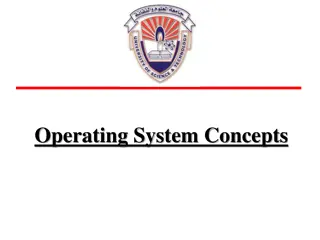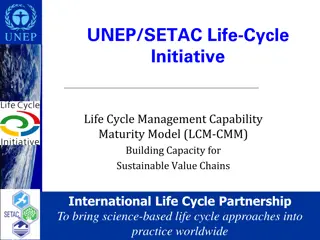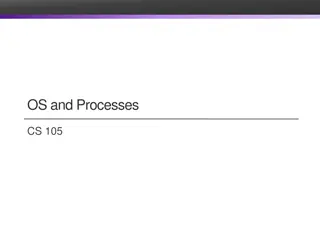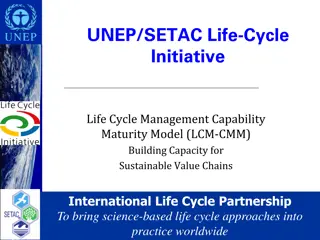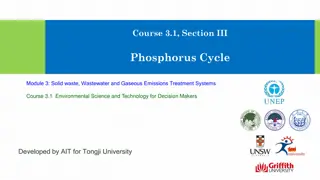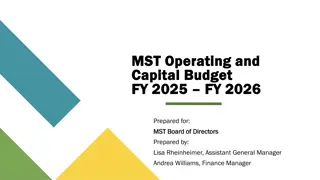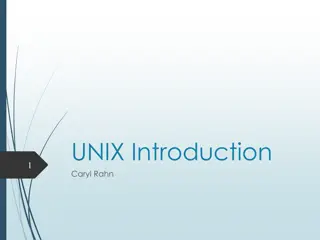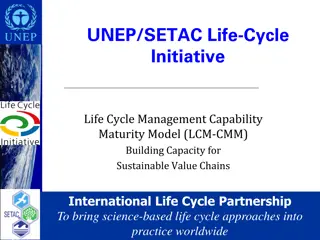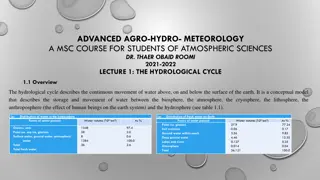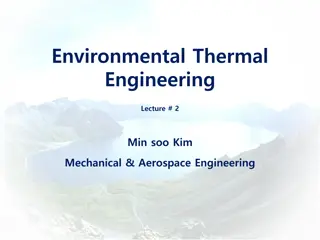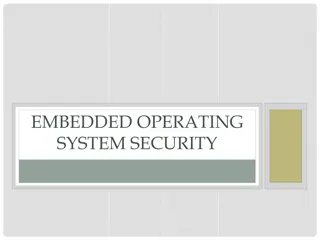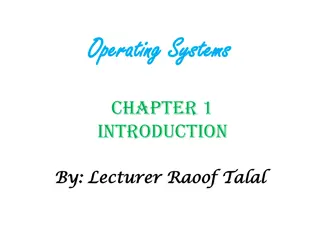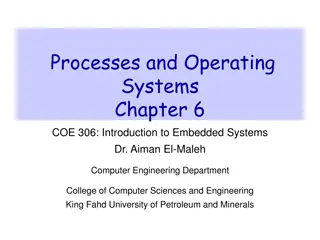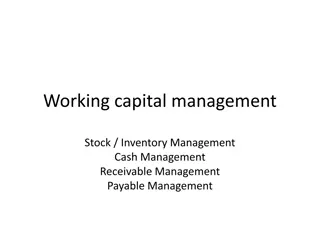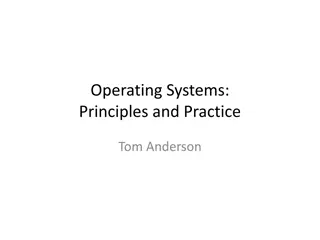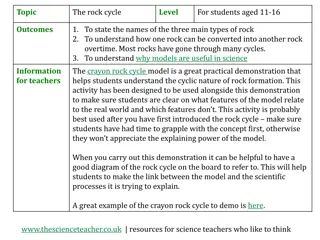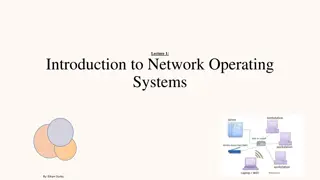Understanding Leverage and Operating Leverage in Financial Management
Leverage in financial management refers to using assets or funds with fixed costs to analyze the impact of debt and equity mix on shareholder returns and risk. Operating leverage focuses on leveraging fixed operating costs to amplify profit changes with sales variations, measured by the degree of op
2 views • 6 slides
Operating Systems
An operating system is a crucial program that manages all other programs on a computer. It handles tasks like input recognition, file management, and device control. There are different types of operating systems such as single-user, single-task systems, multi-user, multi-task systems, real-time ope
6 views • 11 slides
SDS/DYW Annual Operating Plan and Target Operating Model Guidance - March 2024
This guidance outlines the development of an Annual Operating Plan and Target Operating Model (TOM) to enhance collaboration and improve outcomes for young people. It emphasizes aligning planning activities, co-designing learner experiences, and maximizing collective resources through strategic part
1 views • 9 slides
Maintaining an Operating Table: Principles and Functions
An operating table system comprises three components - the table column, table top, and transporter, each available in different versions for various surgical disciplines. Stationary tables are anchored to the floor, offering flexibility to adapt to patient needs. Mobile tables provide maneuverabili
0 views • 12 slides
Factors Affecting the Hydrological Cycle: Understanding Physical and Human Influences
The hydrological cycle is influenced by both physical and human factors. Physical factors such as relief, vegetation, basin size, rock type, soil type, and climate all play a role in shaping the movement of water through the cycle. Human activities like forestry, urbanization, deforestation, mining,
2 views • 20 slides
Understanding the Accounting Cycle Process
The accounting cycle is a comprehensive process that involves recording and processing all financial transactions of a company, from their occurrence to their representation in financial statements and closing of accounts. It is crucial for bookkeepers to manage the entire cycle, which includes step
0 views • 11 slides
Urea Biosynthesis and the Krebs-Henseleit Cycle in the Liver
Urea is synthesized in the liver through a series of enzymatic steps known as the urea cycle or Krebs-Henseleit cycle. This process involves converting toxic ammonia into urea, a less toxic and water-soluble compound that can be easily excreted in urine. The liver plays a crucial role in urea biosyn
1 views • 20 slides
Understanding Operating Costing in Service Industries
Operating costing is a method utilized by service-oriented businesses to ascertain the costs of providing services. Industries such as transportation services, welfare services, utility suppliers, and municipal services find operating costing beneficial. The method involves classifying costs into th
0 views • 6 slides
Understanding Operating Systems: Basics and Types
An operating system is essential software that manages a computer's hardware and software, allowing users to interact with the computer. Learn about the functions of an operating system, its importance, types available such as Microsoft Windows and macOS, and how they impact different devices. Disco
1 views • 11 slides
NASA Platform Layer Updates for the CAELUM (7.0) Release
The National Aeronautics and Space Administration (NASA) discusses platform layer updates for the CAELUM (7.0) release of the Core Flight System in the 2021 Flight Software Workshop. The platform layer consists of the Operating System Abstraction Layer (OSAL) and Platform Support Package (PSP), whic
1 views • 20 slides
Understanding the Cycle of Erosion: Applied Geomorphology Perspective
The Cycle of Erosion model, developed by Davis in the 1880s, explores the process of landmass upliftment, river erosion, and landscape transformation. The Normal Cycle of Erosion focuses on fluvial processes as the primary geomorphic agent, leading to the formation of peneplains. This cycle progress
0 views • 23 slides
Understanding the Accounting Cycle
The accounting cycle is a comprehensive process that involves recording and processing all financial transactions of a company, from their occurrence to their representation on financial statements and closing the accounts. This cycle, essential for bookkeepers, includes steps like transactions, jou
0 views • 11 slides
Understanding Operating Systems: Introduction and Functions
An operating system plays a crucial role in managing computer hardware and facilitating user-computer interactions. It serves as an intermediary between users and hardware components, ensuring efficient resource allocation and control. The operating system coordinates the use of hardware resources b
5 views • 16 slides
Understanding the Business Cycle and Its Phases
The business cycle, also known as the trade cycle, depicts the cyclical nature of economic activity with alternating periods of prosperity, recession, depression, and recovery. It involves fluctuations in production, prices, income, employment, exports, and imports. The cycle affects all industries
1 views • 15 slides
Understanding the Calvin Cycle in Photosynthesis
The Calvin cycle, also known as the light-independent reactions, is a crucial part of photosynthesis where carbon dioxide is converted into glucose. This cycle occurs in the stroma of chloroplasts and utilizes ATP and NADPH from the light-dependent reactions to produce sugars for plants. It consists
5 views • 15 slides
Understanding Operating Systems: Functions and Evolution
Operating systems are essential software that enable computers to function effectively by managing hardware resources and facilitating communication between applications and hardware. This article covers the basics of operating systems, their structure, evolution, functions, and types. It also explo
2 views • 23 slides
Understanding Operating System Concepts: Lecture Overview and Services
Exploring the lecture content on operating system concepts, structures, services, system calls, and file manipulation. Delve into the importance of operating system services, error detection, program execution, I/O operations, protection, security, and resource allocation in operating systems. Learn
4 views • 26 slides
Ideal Reheat Rankine Cycle Analysis for Steam Power Plant
Analyzing the thermal efficiency and mass flow rate of an ideal Rankine cycle with superheat and reheat using steam as the working fluid. The cycle involves stages of expansion, reheating, and condensing to generate a net power output of 100 MW. Detailed calculations for states of the cycle are prov
1 views • 5 slides
Adapting Contest Strategies for Declining Solar Cycle 24 and Solar Cycle 25 Precursors
As Solar Cycle 24 rapidly declines, preparations for the subsequent Solar Cycle 25 are crucial. Insights on weak solar activity, potentially weak Cycle 25, and the impact on contest strategies are discussed. Improved DX propagation, reliable openings, and signal strengths to Europe and Japan, amidst
0 views • 12 slides
Recognizing Patterns of Dating Violence and the Cycle of Abuse
Understanding the phases of dating violence is crucial in recognizing and addressing abusive behavior. The cycle typically begins with tension building, leading to an explosion of abuse in various forms. This is followed by a honeymoon phase where the abuser apologizes and makes promises. However, t
0 views • 6 slides
Sustainable Value Chains and Life Cycle Management Capability
The UNEP/SETAC Life-Cycle Initiative focuses on building capacity for sustainable value chains through the Life Cycle Management Capability Maturity Model (LCM-CMM). It emphasizes implementing science-based life cycle approaches globally by transitioning from events to management systems, conducting
1 views • 12 slides
Introduction to Operating Systems and Processes
In this informative content, we delve into the fundamental concepts of operating systems (OS) and processes. Operating systems are essential software that manage a computer's resources for users and applications. We explore the core functionalities of an OS, such as resource allocation, isolation, c
0 views • 41 slides
Life Cycle Management for Sustainable Value Chains: Building Capacity and Promoting Innovation
This content delves into the Life Cycle Management Capability Maturity Model (LCM-CMM) aimed at enhancing sustainable value chains globally. It emphasizes the importance of bringing science-based life cycle approaches into practical implementation to address global issues, international standards, c
1 views • 11 slides
Fuel Cycle Analysis Toolbox: Enhancing Understanding and Optimization
This presentation focuses on the analyses and evaluations essential for assessing the potential of a fuel cycle, emphasizing different time scales, system sizes, objectives, and audiences. It discusses the need for coupled analyses, various tools required, and opportunities for improvement through i
1 views • 11 slides
Understanding the Phosphorus Cycle in Environmental Science
Exploring the intricate processes of the phosphorus cycle, this module delves into how solid waste, wastewater, and gaseous emissions are treated within environmental science and technology frameworks. The discussion covers the distinctive aspects of the phosphorus cycle, its impact on land and wate
0 views • 13 slides
Role of Cell Cycle in Nanoparticle Uptake and Dilution in Cell Population
The cell cycle plays a crucial role in the cellular uptake and dilution of nanoparticles within a cell population. This process involves different phases such as G1, S, G2, and M, each with specific functions related to cell growth, DNA synthesis, protein synthesis, and cell division. Understanding
0 views • 20 slides
MST Operating and Capital Budget FY 2025 Summary
The MST Operating and Capital Budget for FY 2025 focuses on maximizing revenues, increasing bus advertising rates, promoting transit services, seeking grants for capital projects, and maintaining stable staffing levels. The budget priorities also include operating a Better Bus Network at Board-adopt
0 views • 10 slides
Understanding UNIX Operating System
UNIX is a versatile operating system that enables multi-user access, multitasking, and portability across various computing environments. It serves as the foundation for many modern operating systems and has influenced concepts incorporated in Microsoft Windows and DOS. The UNIX system comprises dis
0 views • 51 slides
Sustainable Value Chains and Business Context in Life Cycle Management
The UNEP/SETAC Life-Cycle Initiative focuses on building capacity for sustainable value chains worldwide through the Life Cycle Management Capability Maturity Model. Understanding the competitive, environmental, and business contexts is crucial for implementing science-based life cycle approaches ef
0 views • 15 slides
Understanding the Hydrological Cycle in Advanced Agro-Hydro-Meteorology
The hydrological cycle involves the continuous movement of water on, above, and below the Earth's surface, encompassing various realms such as the biosphere, atmosphere, cryosphere, lithosphere, and hydrosphere. This cycle describes the storage and movement of water within different Earth systems an
0 views • 14 slides
Introduction to Linux: Course Overview and Objectives
This introduction to Linux course provides a comprehensive overview of operating systems, including the history, variations, user interface, and essential commands. The course is designed with lectures, labs, and exercises to help participants gain a better understanding of Linux and its practical a
0 views • 77 slides
Fundamentals of Environmental Thermal Engineering in Mechanical & Aerospace Engineering
Explore the key concepts of environmental thermal engineering in Mechanical & Aerospace Engineering, covering topics such as the Carnot cycle, actual vapor-compression cycle, principles of the vapor-compression cycle, Carnot heat engine, refrigeration cycle, and coefficient of performance. Understan
0 views • 51 slides
Understanding Embedded Operating System Security
Embedded operating systems are designed for special purposes with limited resources and small sizes, found in various devices like ATMs, smartphones, cars, and more. Common operating systems include VxWorks, Windows, QNX, and SCADA, with different applications and requirements. Windows CE stands out
0 views • 21 slides
Understanding Operating Systems: An Introduction and Overview
An operating system is a crucial program that manages computer hardware and serves as an intermediary between users and hardware. This chapter explores the role of operating systems in a computer system, covering components like hardware, application programs, and users. It delves into how operating
0 views • 16 slides
Introduction to Processes and Operating Systems in Embedded Systems
Processes and operating systems play a crucial role in building complex applications on microprocessors, offering flexibility to meet timing requirements. The operating system (OS) manages processes by providing mechanisms for switching execution between them. Real-Time Operating Systems (RTOS) are
0 views • 65 slides
Understanding Working Capital Management and Operating Cycle in Business
Working capital management is crucial for a business's financial health, involving aspects like stock/inventory management, cash management, receivable management, and payable management. This process balances profitability and liquidity, aiming to optimize the operating cycle that converts cash int
0 views • 19 slides
Understanding Operating Systems: Principles and Practice in CSE Curriculum
Dive into the world of operating systems through the lens of "Operating Systems: Principles and Practice" by Tom Anderson. Discover how this course fits in the UW CSE curriculum, covering systems programming, operating system interfaces, and distributed systems. Explore the project work on building
0 views • 21 slides
Exploring the Rock Cycle Using the Crayon Rock Cycle Model
This educational resource focuses on teaching students aged 11-16 about the rock cycle, including the types of rocks, how rocks transform over time, and the importance of models in science. It introduces the crayon rock cycle model as a hands-on demonstration to help students grasp the cyclic nature
0 views • 4 slides
An Overview of Network Operating Systems and Multitasking
This informative content discusses the services of network operating systems, multitasking concepts, essential components, client and server software elements, and network services. It explains the two forms of multitasking - preemptive and nonpreemptive - and their functions within operating system
0 views • 48 slides
Overview of Network Operating Systems and Their Features
Network operating systems are essential software that manage computer resources and provide services for programs. This lecture covers the types of computers in a network, features of operating systems such as process and memory management, disk and file systems, and networking capabilities. Underst
0 views • 27 slides
